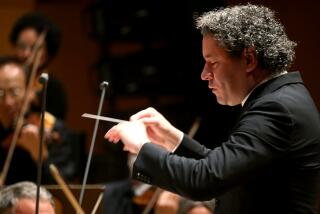The Phoneme Phenom : Uninhibited Composer Lets UCI Audience Help Create Piece
- Share via
In the great classical tradition extending from Bach to at least Liszt, Daniel Lentz composed a work on the spot for his audience Wednesday at the Fine Arts Gallery at UC Irvine.
But the composer’s working methods would probably have surprised his predecessors. This same man was fired from UC Santa Barbara in 1969 for asking two naked people to simulate intercourse underneath a grand piano as part of a piece called “Love and Conception.” Also, his “Kissing Song” did not debut as scheduled in 1978 because the singers objected to sliding their tongues in and out of each other’s mouths.
Lentz, who is from Los Angeles, seems to have calmed down since then, though, and has gone the route of the minimalists. Wednesday night, he asked for a phrase of eight to 12 syllables to serve as a text of a piece for soprano and keyboard. Suggestions from the 60-member audience were not exactly inspired (“UCI Fine Arts Gallery” and “I am a poor, wayfaring stranger”). The 46-year-old composer settled on “Why write music on Saturday?”
He then called for rules to write by (remember Robert Frost’s saying, that writing free verse is like playing tennis with the net down?), and settled on three: Stick to three chords (E-flat minor, F-sharp minor and F minor), a time signature of 5/4, and a brisk tempo of 126 quarter beats per minute.
Then, he turned to a blackboard and got to work while his wife, soprano Jessica Lowe, talked about his composing methods, which involve sung word games based on adding or subtracting tiny bits of syllables called phonemes. For example, in the one-syllable words tip and dip, the t and d are the phonemes that distinguish them. Composers have been exploring the use of phonemes since at least the 1960s.
In the “additive” method used by Lentz, his wife sang a line of scat-like phonemes that were tape-recorded and instantly played back over her next vocal line, which varied from the first.
As the process continued several times, the soloist appeared to become a “duet,” “trio,” “quartet” and so on, until finally the desired sentence emerged, as if by magic. Meanwhile, all kinds of other “allusive” words and meanings could be heard along the way, enriching the experience.
Lentz and Lowe also demonstrated a “subtractive” approach, with a tape recording that began with a jumble of sounds that were successively filtered until the sought-after sentence could be heard.
The “Why write music on Saturday?” piece composed on the spot by Lentz Wednesday didn’t work out quite as neatly as some more complex recorded works he played to the audience (in one of them, he had been able to simulate the sound of a large cathedral choir by overlapping voices). Timing, which has to be split-second, seemed to pose the biggest problem.
But it did offer an audience a chance to be an active participant at a classical concert, something that rarely occurs today.
Lentz was the third of four contemporary composers-musicians speaking this month at the Fine Arts Gallery. John King, a composer from Los Angeles, will complete the series Tuesday at 7:30 p.m. Admission is free. Information: (714) 856-6610.
More to Read
The biggest entertainment stories
Get our big stories about Hollywood, film, television, music, arts, culture and more right in your inbox as soon as they publish.
You may occasionally receive promotional content from the Los Angeles Times.










